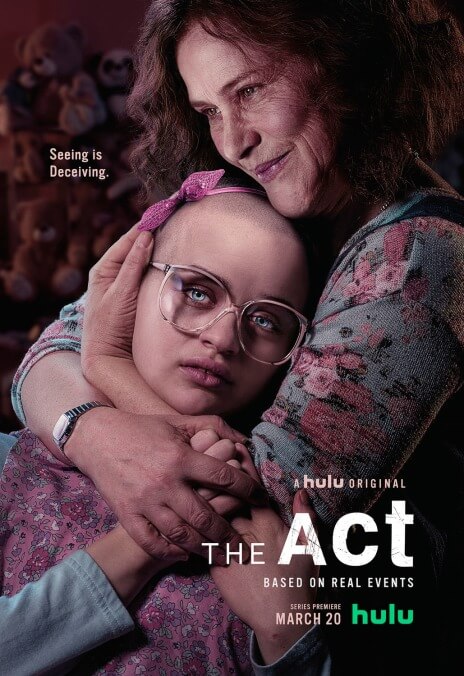The Act is a dishy guilty pleasure wrapped up in a pretty prestige bow

Calling Dee Dee Blanchard an “overprotective mom” would be a dramatic understatement. Blanchard suffered from Munchausen syndrome by proxy, a more-common-than-you-might-think mental disorder where a caregiver fakes, or even induces, illness in someone in their care in order to gain money, sympathy, or some other form of attention. It’s an obscene corruption of the most intimate bonds of familial trust, a form of physical and psychological abuse so twisted it’s difficult for victims to ever recover.
Blanchard held her daughter, Gypsy Rose, hostage in this manner for more than 20 years, convincing Gypsy and everyone around them that her daughter was intellectually disabled (she isn’t), paraplegic (she isn’t), and a cancer survivor (she isn’t), among dozens of other made-up diagnoses. She forbade Gypsy to go to school, have friends, go anywhere unsupervised, or even eat solid food, instead browbeating doctors into maintaining a medically unnecessary feeding tube for her daughter. Then, in 2015, Gypsy, who thought she was 19 at the time (she was really 23), conspired with her secret online boyfriend to murder her mom, buying him a bus ticket from Wisconsin to Missouri so he could do what Gypsy couldn’t bring herself to with a fishing knife purchased at the mall. She’s currently serving a 10-year sentence, and will be eligible for parole in 2024. The boyfriend, Nicholas Godejohn, was sentenced to life in prison in January.
These are the basic facts of the case, which was profiled in a BuzzFeed article in 2016 and was turned into a documentary called Mommy Dead And Dearest for HBO in 2017. Now Michelle Dean, the author of the BuzzFeed piece, serves as co-creator of a new Hulu series called The Act that dramatizes the events leading up to Dee Dee’s murder in riveting, emotionally charged detail. This is the first installment in what’s planned as an anthology series, with a new true-crime story fictionalized each season. As always with true crime—a genre where we always know, or at the very least can find out, how the story ends—the gratification of The Act is in the telling. And the show, spread out over 10 leisurely hours that greatly expand on Lifetime’s condensed treatment of the story in the recent TV movie Love You To Death, only gets more compelling with every new reveal.
From the very first shot of the pilot episode—a hallway littered with overflowing plastic bins full of toys—The Act takes a dishy joy in serving up the perverse details of Dee Dee’s long con. These details are presented in two primary ways: First, there’s the commendably meticulous costumes and production design, which place Gypsy and Dee Dee in a psychotically juvenile world full of stuffed animals, princess dresses, and feminine shades of pink and purple. Juxtaposed with sinister scenes of abuse straight out of a Stephen King novel, the effect is truly unnerving—and extremely effective in conveying Gypsy’s stunted emotional state.
The other factor influencing The Act’s emotional effectiveness is its two leads, both of whom seem to be aiming for awards-season glory with their performances. Clad in frumpy smock dresses and frizzy wigs, Patricia Arquette conveys Dee Dee’s gradual decline from a shady small-time grifter into the fog of true insanity so convincingly, she even manages to dredge up some sympathy for this unsympathetic woman. She might be playing a real-life Margaret White, but Piper Laurie in Carrie this isn’t. And Joey King, unrecognizable in childlike clothing and a shaved head, rises admirably to the challenge of performing opposite an Oscar winner, registering a symphony of complex emotions in an unbroken long shot at the end of episode three that crackles with unspoken tension.
The casting of Chloë Sevigny as the single mom across the way and AnnaSophia Robb as her rebellious daughter is similarly brilliant, serving both as tough-minded realist counterpoints to the sheltered Dee Dee and Gypsy and as skeptical stand-ins for audience members yelling at the TV that “Something is up with this lady!” (Sevigny’s Mel is also seen discussing Nancy Grace with her friends and watching a true-crime show on TV in a wink and a nod to the show’s core viewership.) The tone of the series is uneven, playing at times like an episode of a network procedural and at others like a so-called elevated genre piece. But the conspiratorial element, the voyeuristic thrill of neighbors leaning in closer to hear the whispered details of an especially juicy piece of gossip, remains constant throughout, becoming particularly titillating when Gypsy begins exploring BDSM porn during forbidden late-night web surfing on a secret laptop.
Appropriately for a crime that was fomented on Facebook, ever since it broke, Gypsy’s story has been the subject of online conspiracy theories, many of them hatched in Facebook groups. Given that Dee Dee died without ever receiving a formal psychiatric evaluation, her side of the story will forever remain untold, leaving social media sleuths to wonder aloud—whether in good faith or bad—if Gypsy is a reliable narrator of her own life. The first five episodes of The Act are on Gypsy’s side, painting her as an unequivocal victim; that being said, only the first half of the season was made available for pre-air reviews, so there may still be a dramatic reversal coming in the latter half. Either way, hopefully they won’t spare a single detail.